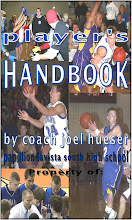
The need for discipline applies first to conditioning. It’s painful and grueling, but there’s no alternative. You can’t lead the fast break or tear down 20 rebounds a game if you can’t run and jump without fatigue. Getting into shape and pushing the body to new levels every day is a mental activity. When you believe that you can’t do another lap or another push-up or another abdominal crunch, your mind forces you to go ahead. When your wind is short and you have a pain in your side from running, only your mind can get you to withstand the pain and go on. As UCLA’s legendary coach John Wooden says, “Nothing will work unless you do.”
I used to hate getting into shape no matter which routines I followed- laps, line drills, playing one on one full court, running the floor while passing the ball back and forth with two teammates. After six weeks of agony, during which every part of my body ached so badly that many mornings I crawled from bed to bathroom to soak in a hot tub, the pain began to diminish and the muscles started to come around. When you train seriously for basketball, you learn the difference between getting into condition and getting into condition. In the lesser of those two states, you can run up and down the floor and do what you have to do without the interference of fatigue. But you’re not really in peak condition until you can cruise when others push. When your body is honed, you can run your opponents around and around, with little immediate purpose beyond tiring them out, making them angry, or distracting them from any defensive concentration. My toughest opponent, John Havlicek of the Boston Celtics, was a true genius when it came to using conditioning as a weapon. His goal was to get his opponent to give up, to stop overcoming fatigue, to stop pushing himself. Havlicek saw it as a matter of who gives up first. “You’ll pass out before you’re overworked, bust most people don’t know that,” he once told Orlando Magic senior executive vice president Pat Williams. “They think they’re overworked, so they stop. They could have kept going, but they didn’t. They weren’t beat physically; they were beat mentally.”


No comments:
Post a Comment